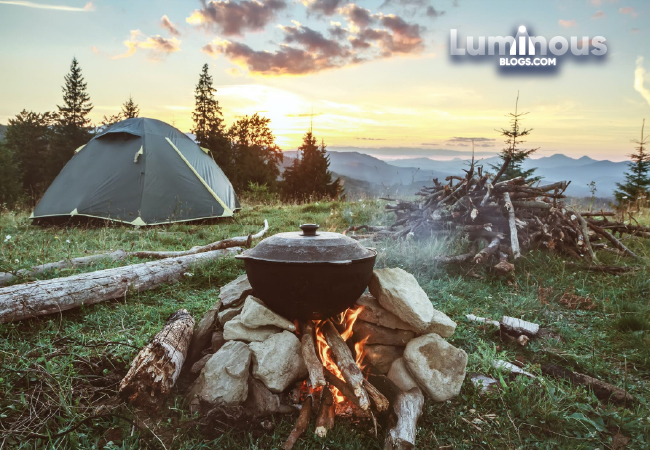
Camping Essentials: Gear and Tips for Outdoor Enthusiasts
There's something magical about spending a night under the starry sky, surrounded by the sounds of nature. Camping is a beloved outdoor activity that allows you to disconnect from the hustle and bustle of daily life and connect with the natural world. To make your camping experience enjoyable and stress-free, it's essential to be well-prepared. In this blog, we'll explore the must-have camping gear and share valuable tips to ensure your next outdoor adventure is a success.
Choose the Right Campsite
Selecting the perfect campsite is the first step in planning a successful camping trip. Consider factors like proximity to water sources, access to hiking trails, and the availability of shade. Research the campsite's amenities, rules, and regulations to ensure they align with your camping needs and preferences.
Shelter: Tents, Hammocks, or RVs
Your choice of shelter depends on your camping style.
Tents: Traditional tents provide protection from the elements and come in various sizes and designs, including backpacking tents and family tents. Look for a tent that suits your group size and the climate you'll be camping in.
Hammocks: Hammock camping is a lightweight and versatile option. You'll need a sturdy, camping-specific hammock, tree straps, and a rainfly for wet weather.
RVs: For a more comfortable camping experience, consider renting or owning a recreational vehicle (RV). RVs provide shelter, cooking facilities, and even bathrooms, making them ideal for extended camping trips.
Sleeping Essentials
A good night's sleep is essential for an enjoyable camping experience. Ensure you have:
Sleeping Bags: Choose a sleeping bag appropriate for the season and temperature of your camping destination.
Sleeping Pads: These provide insulation and cushioning to keep you comfortable throughout the night.
Pillows: Pack inflatable camping pillows or stuff sacks with soft clothing for a more comfortable night's sleep.
Camp Kitchen Setup
Eating well while camping is crucial. Here's what you'll need:
Camp Stove: Opt for a portable camp stove for cooking. Consider fuel type (propane, butane, or alcohol) and the number of burners.
Cookware: Pack a pot and pan suitable for camping, along with utensils, a knife, and a cutting board.
Dishes and Utensils: Bring plates, bowls, cups, and eating utensils. Consider lightweight, durable, and eco-friendly options.
Cooler: A good-quality cooler keeps your perishable food fresh. Consider models with good insulation and sufficient storage space.
Food Storage: Use sealable bags, containers, and bear-resistant containers if camping in bear-prone areas.
Clothing and Layering
Proper clothing can make a significant difference in your camping experience. Follow the layering principle:
Base Layer: Moisture-wicking clothing that keeps you dry and comfortable.
Insulating Layer: Warm clothing like fleece or down jackets for insulation.
Outer Layer: Waterproof and windproof outerwear to protect against the elements.
Hats and Gloves: These help regulate body temperature and protect against cold weather.
Durable Footwear: Choose waterproof, supportive, and comfortable hiking boots or shoes.
Lighting and Navigation
Camping in the dark can be challenging, so pack the following items:
Headlamp or Flashlight: Essential for hands-free lighting.
Batteries and Chargers: Carry extra batteries and a portable charger for electronic devices.
Map and Compass: Even in the age of GPS, it's essential to have a map and compass for navigation.
First Aid Kit
Safety should be a priority when camping. Pack a well-equipped first aid kit that includes:
Bandages and gauze
Antiseptic wipes
Tweezers
Pain relievers
Allergy medication
Medical tape
Scissors
Emergency contact information
Fire-Making Tools
Fire is not only for warmth but also for cooking and signaling for help. Ensure you have:
Waterproof matches or a lighter
Firestarter
Firewood or a camping stove
Water and Filtration
Access to clean water is crucial for camping. Carry:
Reusable water bottles or hydration reservoirs
Water filtration or purification methods (e.g., filters, iodine tablets, or UV sterilizers)
Collapsible water containers
Camping Extras
There are several additional items that can enhance your camping experience:
Backpack: A comfortable and spacious backpack is essential for backpacking trips.
Multi-Tool or Knife: These tools come in handy for various campsite tasks.
Duct Tape: A versatile tool for quick repairs.
Insect Repellent: Protect yourself from pesky insects and ticks.
Camping Chairs: Portable camping chairs offer comfort around the campfire.
Camping Table: A folding camping table is handy for preparing food and dining.
Entertainment: Bring books, games, or musical instruments for downtime.
Leave No Trace
Practicing Leave No Trace principles is vital for preserving the natural environment. Always clean up after yourself, dispose of waste properly, and respect local wildlife and plants.
Campfire Safety
If you plan to have a campfire, follow safety guidelines and check for fire restrictions in your camping area. Use established fire rings or pits, keep fires small, and never leave a fire unattended.
Wildlife Safety
Be aware of wildlife in the area. Store food securely to prevent attracting animals to your campsite. Learn about the local wildlife and how to behave around them to ensure safety for both you and the animals.
Camping Etiquette
Respect fellow campers by keeping noise levels down and adhering to campsite rules. If you encounter other campers, greet them politely and maintain a friendly attitude.
Campsite Cleanup
Before leaving your campsite, thoroughly clean up. Pack out all trash and follow the "Leave No Trace" principles. Leave the campsite as beautiful as you found it for future generations to enjoy.
Check the Weather
Always check the weather forecast for your camping destination and be prepared for sudden changes. Pack appropriate clothing and gear for the expected conditions.
Follow Local Regulations
Ensure you are aware of and adhere to any camping regulations specific to your chosen campsite, such as permits, campfire restrictions, and waste disposal rules.
Be Flexible
Camping often involves dealing with unforeseen challenges. Stay flexible and adapt to changing conditions and situations.
Connect with Nature
Camping is not just about disconnecting from the world but also connecting with nature. Take time to observe wildlife, explore hiking trails, and immerse yourself in the natural beauty around you.
Respect Nature's Rhythms
Enjoy the tranquility of nature and adjust your daily schedule to nature's rhythms, including the rising and setting of the sun and the calls of birds and other wildlife.
Conclusion: Embrace the Great Outdoors
Camping is an opportunity to embrace the great outdoors, disconnect from the digital world, and connect with nature. To make the most of your camping experience, invest in quality gear, follow safety guidelines, and practice Leave No Trace principles. Whether you prefer the ruggedness of backpacking or the comforts of RV camping, the key to a successful trip is being well-prepared and ready to appreciate the wonders of the natural world. So pack your essentials, embrace the adventure, and let the great outdoors become your temporary home away from home.


